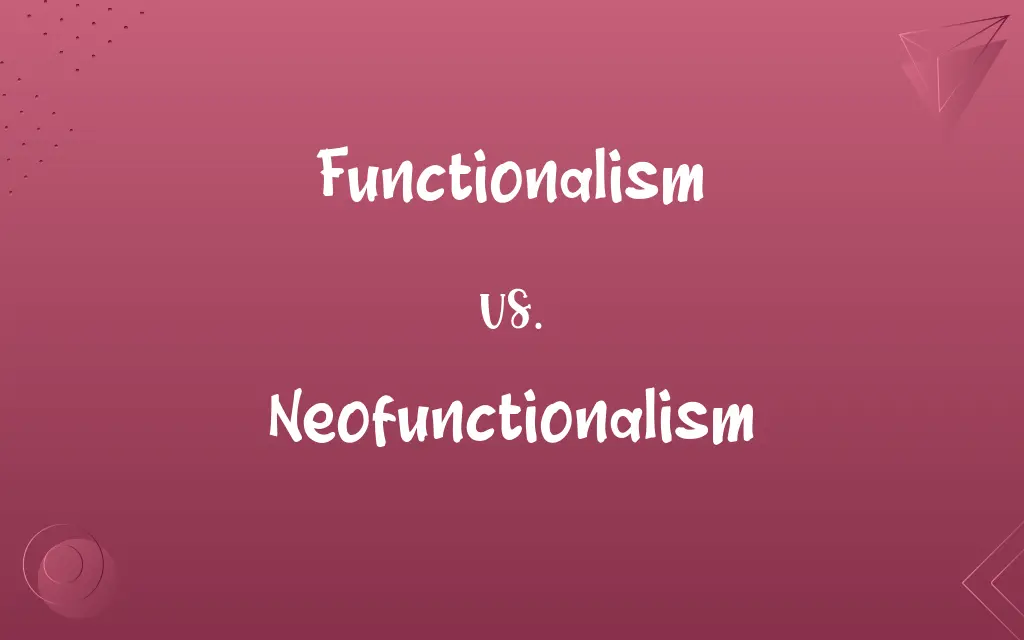Functionalism vs. Neofunctionalism: Know the Difference

By Shumaila Saeed || Updated on December 25, 2023
Functionalism focuses on how societal institutions serve essential functions; Neofunctionalism extends this by emphasizing gradual integration, especially in political contexts.

Key Differences
Functionalism is a social theory that emphasizes the interdependence of different parts of a society, suggesting that each part contributes to the stability and functioning of the whole. Neofunctionalism, on the other hand, evolved from functionalism, focusing more on how new functions emerge to resolve conflicts within a society. While functionalism views society as a static system of interconnected parts, neofunctionalism introduces the idea of dynamic processes leading to new functions in response to societal needs.
Shumaila Saeed
Dec 16, 2023
In functionalism, each part of society is understood in terms of its relationship to the whole, where institutions and social practices exist because they serve a vital role. Neofunctionalism diverges by emphasizing the process of integration, especially in a political context like the European Union, where separate national entities gradually transfer power to a central authority. Functionalism is more concerned with maintaining social order, whereas neofunctionalism is about understanding the evolution and integration of parts within a system.
Shumaila Saeed
Dec 16, 2023
The concept of equilibrium is central to functionalism, as it posits that society tends to return to a state of stability after some disruption. Neofunctionalism challenges this by suggesting that disruptions can lead to new equilibriums through the process of integration, showing a more dynamic and evolving nature of social systems. While functionalism stresses the importance of stability and order, neofunctionalism focuses on change and adaptation as key elements of societal progression.
Shumaila Saeed
Dec 16, 2023
Functionalism often faces criticism for its deterministic view of society and its inability to account for social change effectively. Neofunctionalism addresses some of these criticisms by incorporating ideas about the emergence of new functions and the role of conflict in fostering integration and change. Unlike functionalism, which tends to assume a harmony of interests within society, neofunctionalism recognizes the role of power struggles and negotiations in shaping social structures.
Shumaila Saeed
Dec 16, 2023
Functionalism has been influential in various fields, including sociology, anthropology, and psychology, providing a framework for understanding the stability and cohesion in societies. Neofunctionalism, with its roots in the study of European integration, offers a more dynamic approach to understanding how societies adapt and evolve, particularly in response to political and economic pressures. While functionalism gives a more static view of society, neofunctionalism presents a fluid, evolving perspective.
Shumaila Saeed
Dec 16, 2023
ADVERTISEMENT
Comparison Chart
Foundational Theory
Societal stability through interconnected institutions
Gradual integration of institutions beyond nation-states
Shumaila Saeed
Dec 16, 2023
Academic Discipline
Anthropology, Sociology
Political Science, International Relations
Shumaila Saeed
Dec 16, 2023
Main Focus
Social stability and order
Political integration and supranational governance
Shumaila Saeed
Dec 16, 2023
Criticism
Overemphasis on stability, neglects social change
Eurocentric, underestimates nationalism
Shumaila Saeed
Dec 16, 2023
ADVERTISEMENT
Functionalism and Neofunctionalism Definitions
Functionalism
Functionalism views society as a system of interdependent parts working together for stability.
In functionalism, education is seen as a means to socialize individuals and maintain societal norms.
Shumaila Saeed
Dec 12, 2023
Neofunctionalism
Neofunctionalism is an approach to understanding the dynamics of regional integration.
Neofunctionalism analyzes how the Schengen Agreement facilitated integration among European countries.
Shumaila Saeed
Dec 12, 2023
Functionalism
In functionalism, every aspect of society is interrelated and contributes to the whole.
Functionalism sees the family unit as crucial for nurturing and educating the young, sustaining societal values.
Shumaila Saeed
Dec 12, 2023
Neofunctionalism
Neofunctionalism focuses on the gradual process of political and economic integration.
Neofunctionalism studies the incremental steps leading to the creation of the eurozone.
Shumaila Saeed
Dec 12, 2023
Functionalism
Functionalism emphasizes the role of social institutions in fulfilling societal needs.
According to functionalism, religion helps to reinforce shared values and social cohesion.
Shumaila Saeed
Dec 12, 2023
ADVERTISEMENT
Neofunctionalism
Neofunctionalism emphasizes the role of supranational institutions in fostering integration.
According to neofunctionalism, the EU Parliament plays a key role in transcending national interests.
Shumaila Saeed
Dec 12, 2023
Functionalism
Functionalism considers stability and equilibrium as the natural states of society.
From a functionalist perspective, social change occurs when disruptions to equilibrium necessitate adaptation.
Shumaila Saeed
Dec 12, 2023
Neofunctionalism
Neofunctionalism explores how political entities integrate beyond national boundaries.
Neofunctionalism examines how the European Union evolved from economic to political integration.
Shumaila Saeed
Dec 12, 2023
Functionalism
The doctrine that the function of an object should determine its design and materials.
Shumaila Saeed
Dec 10, 2023
Neofunctionalism
Neofunctionalism extends functionalist ideas to the realm of international politics.
Neofunctionalism explores how international organizations can promote cooperation and conflict resolution.
Shumaila Saeed
Dec 12, 2023
Neofunctionalism
A theory of regional integration inspired by the integration processes between countries in Europe.
Shumaila Saeed
Dec 10, 2023
Functionalism
(Philosophy) The doctrine in the philosophy of mind according to which mental states are defined by their causes and effects.
Shumaila Saeed
Dec 10, 2023
Functionalism
(architecture) A doctrine, in several fields, that the function of something should be reflected in its design and the materials used in its construction.
Shumaila Saeed
Dec 10, 2023
Functionalism
(philosophy) The definition of mental states in terms of their causes and effects.
Shumaila Saeed
Dec 10, 2023
Functionalism
(social science) The idea that social and cultural cohesion are a function of the interdependence and interactions of the institutions of a society.
Shumaila Saeed
Dec 10, 2023
Functionalism
(psychology) A general school of thought that considers psychological phenomena in terms of their role in adaptation to the person's environment.
Shumaila Saeed
Dec 10, 2023
Functionalism
A psychology based on the assumption that all mental process are useful to an organism in adapting to the environment.
Shumaila Saeed
Dec 10, 2023
Functionalism
A psychology based on the assumption that all mental process are useful to an organism in adapting to the environment
Shumaila Saeed
Dec 10, 2023
Functionalism
Functionalism is a theory that explains social phenomena in terms of their societal functions.
Functionalism would view the legal system as a means to enforce societal norms and resolve conflicts.
Shumaila Saeed
Dec 12, 2023
Repeatedly Asked Queries
Who are key proponents of Functionalism?
Émile Durkheim and Talcott Parsons are among the key proponents of Functionalism.
Shumaila Saeed
Dec 16, 2023
What is Functionalism?
Functionalism is a sociological theory that views society as a complex system whose parts work together to promote stability and integration.
Shumaila Saeed
Dec 16, 2023
What is Neofunctionalism?
Neofunctionalism is a theory in political science and international relations focusing on the gradual integration of political entities beyond national boundaries.
Shumaila Saeed
Dec 16, 2023
How does Neofunctionalism differ from Functionalism?
While Functionalism focuses on societal stability and the role of social institutions, Neofunctionalism emphasizes political integration and the role of supranational organizations.
Shumaila Saeed
Dec 16, 2023
Is Neofunctionalism applicable outside of Europe?
While often focused on European integration, Neofunctionalism can be applied to understand regional integration in other contexts.
Shumaila Saeed
Dec 16, 2023
Can Functionalism explain social change?
Functionalism has been criticized for its focus on stability and equilibrium, often overlooking the dynamics of social change.
Shumaila Saeed
Dec 16, 2023
Does Neofunctionalism focus only on political integration?
While political integration is a key focus, Neofunctionalism also addresses economic and social aspects of integration.
Shumaila Saeed
Dec 16, 2023
How does Functionalism view social institutions?
Functionalism sees social institutions as essential components that serve specific functions to maintain social order.
Shumaila Saeed
Dec 16, 2023
What role do institutions play in Neofunctionalism?
In Neofunctionalism, institutions, especially supranational ones, are crucial in fostering and managing the process of integration.
Shumaila Saeed
Dec 16, 2023
Who developed Neofunctionalism?
Ernst B. Haas is a notable scholar who developed Neofunctionalism.
Shumaila Saeed
Dec 16, 2023
How do Functionalism and Neofunctionalism view conflict?
Functionalism often views conflict as a disturbance to social order, while Neofunctionalism may see it as a driving force for political integration.
Shumaila Saeed
Dec 16, 2023
What is a criticism of Functionalism regarding societal change?
Functionalism is criticized for underestimating the role and impact of social change and conflict.
Shumaila Saeed
Dec 16, 2023
In what way does Functionalism address social inequality?
Functionalism tends to view inequality as an inevitable and functional aspect of society, though this view has been challenged.
Shumaila Saeed
Dec 16, 2023
How does Neofunctionalism address nationalism?
Neofunctionalism acknowledges the challenge of nationalism but sees integration as a process that can transcend national interests over time.
Shumaila Saeed
Dec 16, 2023
What is a key critique of Neofunctionalism?
A key critique is its Eurocentric focus and potential underestimation of the resilience of national identities and interests.
Shumaila Saeed
Dec 16, 2023
Does Neofunctionalism consider the impact of globalization?
Neofunctionalism is particularly relevant in the context of globalization, as it addresses the dynamics of regional and global integration.
Shumaila Saeed
Dec 16, 2023
Can Functionalism explain the role of technology in society?
Functionalism can be used to analyze how technological advancements fulfill societal functions and impact social structures.
Shumaila Saeed
Dec 16, 2023
Is Functionalism still relevant today?
Functionalism continues to influence sociological thought, though it has evolved to incorporate critiques regarding its approach to social change and conflict.
Shumaila Saeed
Dec 16, 2023
How does Functionalism view individual behavior?
Functionalism often interprets individual behavior as influenced and shaped by societal structures and norms.
Shumaila Saeed
Dec 16, 2023
How does Neofunctionalism view the role of elites in integration?
Neofunctionalism often highlights the role of political and economic elites in driving the process of integration.
Shumaila Saeed
Dec 16, 2023
Share this page
Link for your blog / website
HTML
Link to share via messenger
About Author
Written by
Shumaila SaeedShumaila Saeed, an expert content creator with 6 years of experience, specializes in distilling complex topics into easily digestible comparisons, shining a light on the nuances that both inform and educate readers with clarity and accuracy.


































































